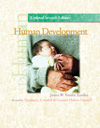 |  Human Development: Updated, 7/e James Vander Zanden,
Ohio State University
Thomas Crandell,
Broome Community College
Corinne Crandell,
Broome Community College
Death and Dying
Chapter OutlineThe concluding chapter of the text considers the antithesis of the life process - the stage of dying and death. Several significant topics are discussed, including:
1The Dying Process. Modern definitions of death and how various societies perceive and recognize death are presented. How the elderly conceive of death, as well as the systematic psychological changes which precede death, is also examined. Kübler-Ross' stages of the death experience are outlined, and a critique of her stage approach is offered. Stress, as a cause of illness and death, is also highlighted. |
 |  |  | 2The Quest for "Healthy Dying." Research findings are presented regarding an individual's need to die with dignity. Salient features of the right-to-die movement are reviewed (such as preparing a living will and a health care proxy), and the controversial issue of euthanasia is discussed. The extraordinary phenomenon of near-death experiences for some who have been declared clinically dead is explored. A special overview of AIDS is also presented, and within the context of "healthy dying," the role of the hospice in comforting those near the end of life's journey is examined. |
 |  |  | 3Bereavement. Findings are revealed regarding typical adjustment to the death of a loved one. Finally, the coping experiences of widows and widowers are examined. |
|



 2003 McGraw-Hill Higher Education
2003 McGraw-Hill Higher Education